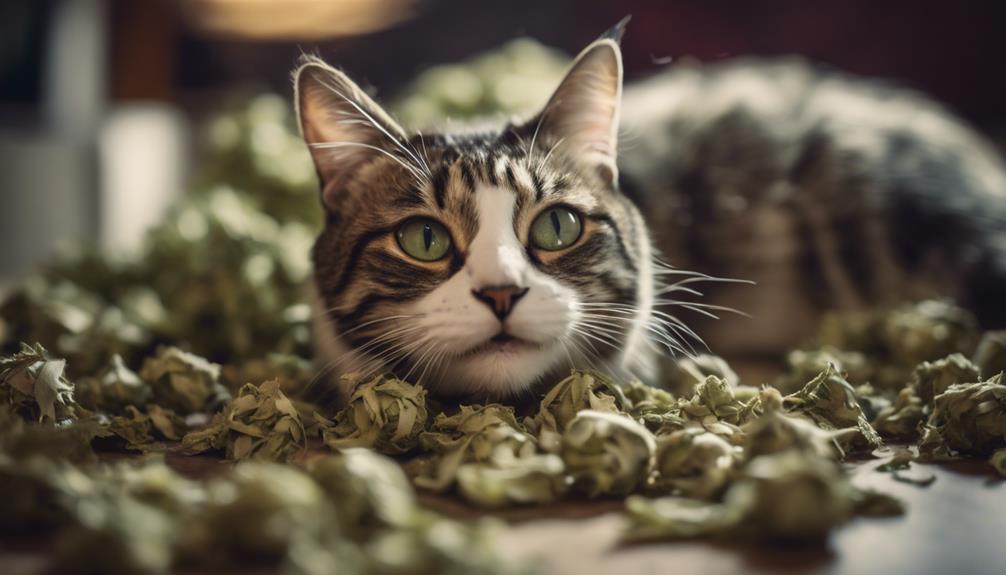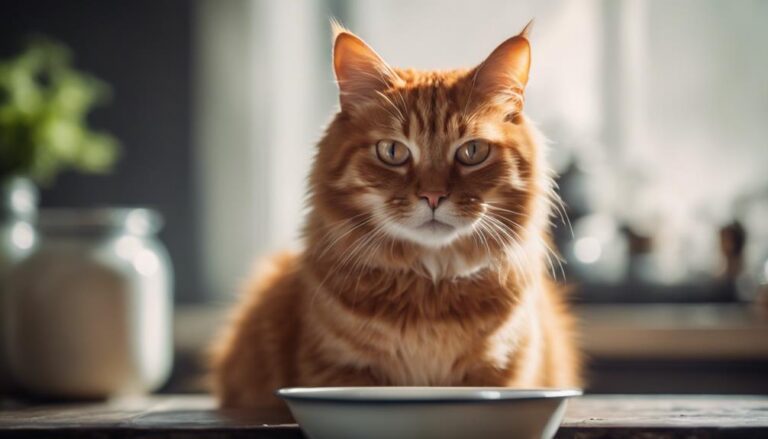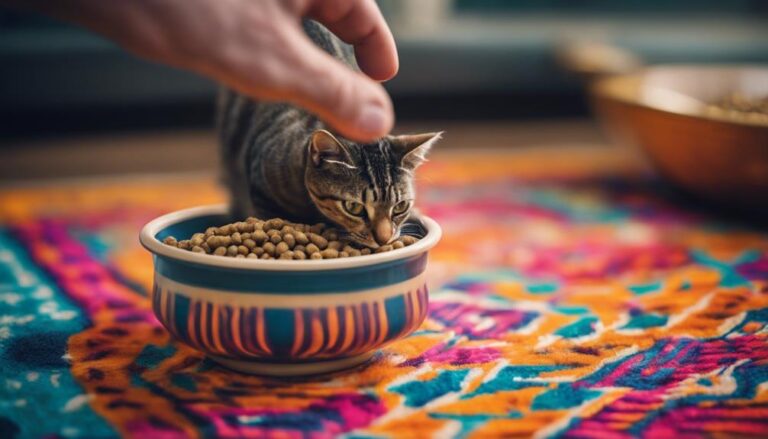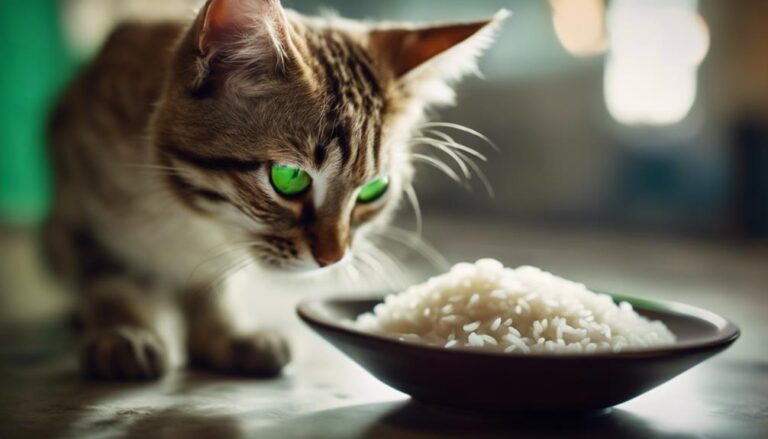If you're wondering whether your cat can eat catnip and what effects it might have, you might be surprised by the outcomes. While catnip is generally safe for felines and can bring about interesting reactions, the specifics of its impact can differ. From inducing relaxation to sparking bursts of energy, catnip's effects are intriguing. However, there's more to uncover about how catnip interacts with your cat's behavior and well-being. So, before you offer your furry friend a taste, consider exploring the nuances of catnip's effects to better understand this curious herb's influence.
How Catnip Affects Cats
When cats encounter catnip, it triggers intense reactions that can lead to various behaviors. Catnip, a herb from the mint family, contains a compound called nepetalactone that cats react to. Typically, cats will exhibit behaviors such as rolling, flipping, rubbing, or zoning out when exposed to catnip.
Interestingly, when cats ingest catnip, it tends to have a sedative effect on them, causing a calming response. However, it's essential to note that while most cats respond positively to catnip, some may have adverse reactions, becoming hyperactive or even aggressive.
Although catnip is generally safe for cats, it's possible for them to overdose on catnip. If a cat consumes too much catnip, they may experience symptoms like vomiting, diarrhea, or excessive agitation. It's crucial to monitor your cat's interaction with catnip to ensure they don't consume excessive amounts, leading to potential negative effects. Remember, moderation is key when it comes to exposing your feline friend to catnip.
Catnip Consumption and Effects
When it comes to catnip consumption and effects on your feline friend, understanding how it impacts them and safe guidelines is crucial.
Catnip can have calming effects and act as a mild sedative for cats when ingested.
Catnip's Effects on Cats
Catnip's effects on cats, triggered by the compound nepetalactone, can induce noticeable behavioral changes in felines. When cats interact with catnip, they may display reactions such as rolling, flipping, rubbing, or zoning out.
Interestingly, the way catnip affects cats can vary depending on how it's consumed. Inhaling catnip can result in increased energy levels, while ingesting it tends to have a calming effect on cats. These effects typically last for around 10 minutes before wearing off.
Cats also have different sensitivities to catnip, with some showing hyperactivity and others possibly displaying aggression when exposed to it. Understanding these effects can help you better manage your cat's interaction with catnip.
Safe Consumption Guidelines
To ensure the safe consumption of catnip by your feline companion, it's important to consider the following guidelines. Catnip is safe for cats to eat in small amounts, providing a mild sedative effect that can help calm them. However, it's crucial to monitor the quantity your cat consumes, as eating too much catnip can result in an upset stomach.
Cats typically show interest in catnip when they're around 3-6 months old. While catnip doesn't offer significant nutritional value, it can be a safe and enjoyable treat for your cat. Remember to offer catnip in moderation to prevent any potential digestive issues and to ensure your cat benefits from its mild sedative properties without any adverse effects.
Understanding Catnip's Impact on Cats
So, what happens when your feline friend encounters catnip?
Well, catnip can trigger a range of behaviors in cats, from calmness to hyperactivity.
Understanding how catnip affects your cat is essential for ensuring a safe and enjoyable experience for your pet.
Catnip Behavior Effects
When cats interact with catnip, they may exhibit a range of behaviors triggered by the active compound nepetalactone, such as rolling, flipping, rubbing, and zoning out. These behaviors are fascinating to observe and are a result of the unique reaction cats have to this compound.
Here are some effects you might notice when your cat encounters catnip:
- Rolling around in delight.
- Flipping or jumping erratically.
- Rubbing their face and body against the catnip.
- Zoning out or becoming overly excited.
These behaviors are a natural response to the nepetalactone in catnip, providing your feline friend with moments of fun and playfulness.
Catnip Health Benefits
Catnip's calming properties can help reduce stress in cats, promoting relaxation and playfulness. When cats react playfully to catnip, it encourages activity, leading to increased exercise and mental stimulation.
Additionally, catnip acts as a natural pest repellent, keeping mosquitoes away from cats. Whether using fresh, dried, or sprayed catnip, some cats may show a preference for dried catnip over fresh.
It's essential to monitor your cat's consumption of catnip to prevent overindulgence and ensure their well-being. By understanding the benefits of catnip, such as stress reduction, increased playfulness, and pest repellent properties, you can provide a stimulating and enjoyable environment for your feline companion.
The Effects of Catnip Ingestion
Ingesting catnip can induce a calming and sedative effect on cats, making them more mellow and relaxed. When your cat ingests catnip, here are some effects you might notice:
- Calming Sensation: Catnip can have a soothing impact on your cat, helping them relax and unwind.
- Reduced Anxiety: Cats may exhibit decreased anxiety levels after consuming catnip, promoting a sense of well-being.
- Increased Playfulness: While some cats become calm, others may become more playful and energetic after ingesting catnip.
- Temporary Sedation: Ingesting catnip can lead to a temporary sedative effect, causing your cat to feel drowsy or sleepy.
Catnip: Impacts on Feline Behavior
Inducing a range of behaviors in felines, catnip can evoke responses like rolling, flipping, rubbing, or zoning out due to its active compound, nepetalactone. This compound, found in the mint family, mimics feline pheromones, leading to these various reactions in cats.
When you give your cat catnip, their sensitivity to it plays a crucial role in the response they exhibit. Some cats may become hyperactive, while others might show more aggressive behaviors.
The effects of catnip typically last for about 10 minutes before gradually wearing off, indicating a temporary impact on your feline friend. Interestingly, the potency of catnip can diminish over time as cats may become desensitized to its effects with frequent exposure.
Catnip Effects and Safety for Cats
When giving your cat catnip, it's important to consider the effects and safety aspects to ensure their well-being and enjoyment. Here are some key points to keep in mind:
- Safe to Give: Catnip is safe for cats to eat and doesn't have addictive qualities.
- Mild Sedative Effect: Eating catnip can have a mild sedative effect on cats, which can help reduce their stress or anxiety levels.
- Not All Cats Are Interested: Not all cats are attracted to catnip, with typically only about half showing interest, usually between 3-6 months of age.
- Moderation is Key: While catnip is safe, consuming too much can lead to an upset stomach in cats. It's essential to control the amount of catnip given to prevent any potential issues.
Catnip Consumption: What to Expect
When your cat consumes catnip, be prepared for a potential mild sedative effect that can promote a sense of calmness. It's important to note that not all cats are responsive to catnip; around half of them may not react at all.
If your cat is one of the sensitive ones, you may observe behaviors like rolling, rubbing, or increased playfulness. However, too much catnip can cause adverse effects like vomiting or diarrhea, so it's best to offer it in moderation.
Cats typically regain their normal behavior after about 10-15 minutes of exposure to catnip. If your cat seems uninterested or loses interest quickly, don't force it on them as they may simply not be attracted to it.
Frequently Asked Questions
What Happens if a Cat Eats Catnip?
If a cat eats catnip, it may experience a mild sedative effect. Catnip is safe in small amounts and can help relax and calm some cats. However, too much catnip can cause digestive upset.
What Does Catnip Actually Do to Cats?
Catnip triggers various behaviors in cats, like rolling or zoning out. It lasts around 10 minutes. When ingested, it's calming; when smelled, it can cause hyperactivity. Cats can get aggressive with it. Be mindful of your cat's reaction.
Does Catnip Make Cats Sleepy or Hyper?
Catnip can have varied effects on cats. It may make you feel sleepy or hyper, depending on your unique response. Eating catnip can be calming, while sniffing it might make you playful. Each cat reacts differently to catnip.
Can Cats React Badly to Catnip?
Yes, cats can react badly to catnip. Some may become aggressive when exposed. It's hereditary, and about 30% don't respond. Kittens under six months may not react. Older cats can lose interest over time. Watch for reactions.






